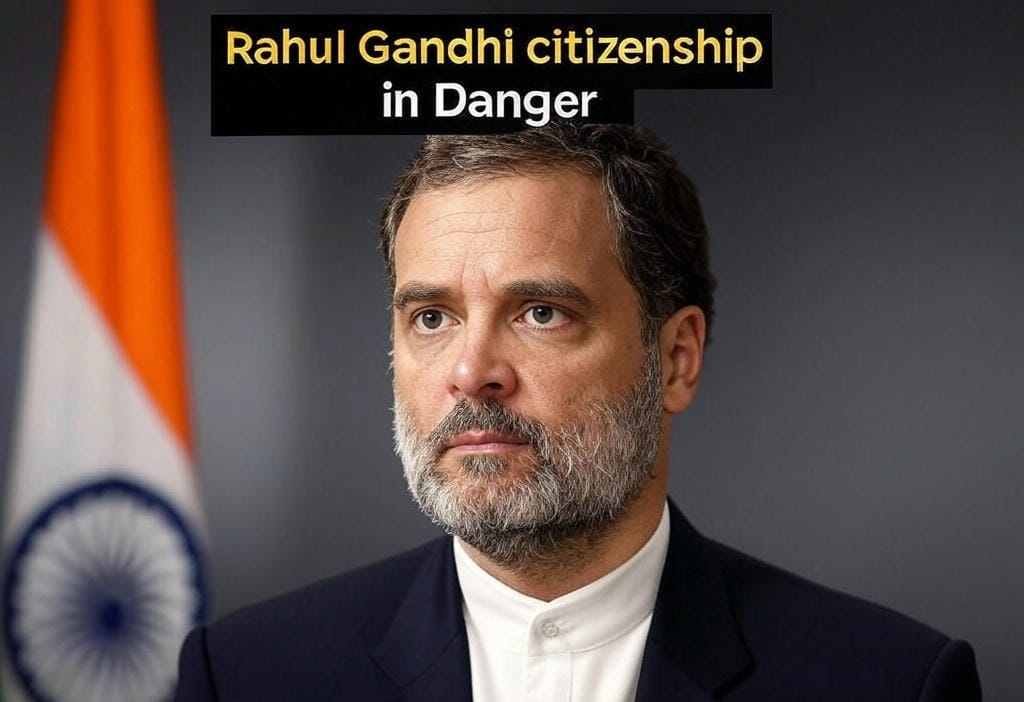On Monday, the Allahabad High Court granted the central government an extension to decide on the representation seeking the cancellation of Congress leader Rahul Gandhi’s Indian citizenship.
This extension adds a new twist to the current controversy regarding Rahul Gandhi’s Indian citizenship, a subject of political and legal discussion for several years.
The Petition and Court Proceedings
The case stems from a Public Interest Litigation (PIL) filed by S. Vignesh Shishir, a member of the Bharatiya Janata Party (BJP) from Karnataka. The petition asserts that Rahul Gandhi holds dual citizenship, particularly British citizenship.
If proven, it could lead to the annulment of Rahul Gandhi’s Indian citizenship and render him ineligible to fight elections or hold office in India under Article 84(a) of the Constitution, which mandates Indian citizenship for parliamentary candidates. The petitioner has requested a probe by the Central Bureau of Investigation (CBI) into the matter and seeks action under the appropriate sections of the Bharatiya Nyaya Sanhita and the Passport Act.
In November 2024, the Lucknow bench of the Allahabad High Court gave directions to the Central Government to provide the details of any action initiated regarding the petitioner’s representation. Through the Deputy Solicitor General Surya Bhan Pandey, the central government informed the court that it had sought information from the UK government about Rahul Gandhi’s alleged British citizenship and requested more time to arrive at a decision.
On March 24, 2025, the Lucknow bench of the Allahabad High Court, consisting of Justices AR Masoodi and AK Srivastava, heard the petition. During the proceedings, the Central Government notified the court that the submission regarding Rahul Gandhi’s Indian citizenship was under consideration by the Ministry of Home Affairs (MHA). The court granted four weeks to the Centre to decide on the matter and scheduled the next hearing for April 21, 2025.
Background of the Citizenship Controversy
Controversy has been dogging Rahul Gandhi’s Indian citizenship for several years. The allegations stem from documents related to a UK-based company, Backops Limited, wherein Rahul Gandhi was reportedly listed as a British national in some of the records. These discrepancies have led to claims that he may have acquired the British citizenship, which conflicts with his status as an Indian citizen.
In India, the Constitution forbids dual citizenship. Under the Citizenship Act, acquiring the citizenship of another country automatically results in the termination of the person’s Indian citizenship. Hence, if he is found to hold British citizenship, Rahul Gandhi’s Indian citizenship will have to be annulled. Such a development could have significant legal and political implications, including his disqualification from holding public office.
Parallel Proceedings and Political Implications
Similar petitions have been filed in other courts, including the Delhi High Court. In March 2025, the Centre informed the Delhi High Court that the issue of Rahul Gandhi’s Indian citizenship was being reviewed by the MHA. The court deferred the hearing, awaiting the center’s resolution.
These parallel proceedings emphasize the political sensitivity of the issue. Rahul Gandhi, as the Leader of Opposition and a very prominent figure in Indian politics, faces heightened scrutiny from political opponents. The BJP has been vociferous in questioning his eligibility, while the Congress party insists that the accusations are unfounded and politically motivated.
Possible Consequences and Legal Outcomes
Several situations could develop in the weeks ahead:
- Centre Upholds Rahul Gandhi’s Indian Citizenship: If the MHA determines that the allegations lack substance, Rahul Gandhi’s Indian citizenship remains intact, which will allow him to continue his political activities without legal hurdles.
- Centre Finds Evidence Supporting Dual Citizenship: Should the MHA find credible evidence that he holds British citizenship, it could initiate proceedings to revoke Rahul Gandhi’s Indian citizenship. This action would likely lead to legal conflicts and could result in his disqualification from Parliament.
- Prolonged Legal Proceedings: Owing to the complexity and political implications, Rahul Gandhi’s Indian citizenship could become entangled in prolonged litigation, delaying any decisive resolution.
Conclusion
The Allahabad High Court’s directive for the Centre to decide on Rahul Gandhi’s Indian citizenship status within four weeks marks a critical juncture in this ongoing dispute. The outcome will have huge implications not only for Rahul Gandhi’s political career but also for the broader debate on citizenship laws and constitutional eligibility in India. As the country waits for the Centre’s decision, the case highlights the complex intersection of law, politics, and individual rights in a democratic structure. The matter of Rahul Gandhi’s Indian citizenship meanders, even as people wait with bated breath for its conclusion.
About Author

Ananda Murthy JS is an English teacher in Hyderabad. His teaching experience spans more than 30 years, which includes his stint as an IGCSE teacher in the Maldives, lecturer in English for Intermediate students, writer and editor/language specialist, and IELTS, GRE and TOEFL trainer. He also provides English coaching to students appearing for CAT, IELTS, GRE and TOEFL privately in Hyderabad. Ananda has proficiency in editing SWOT analyses, market forecast and other reports, conducting Effective English sessions, and imparting training in Business English. He also write business blogs, key word dense articles and original articles on various topics.

